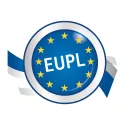Owner
Contact information
If you have any comments or feedbacks on the beta version of ELI-DL, please share them in this discussion topic.
The ELI (European Legislation Identifier) ontology for draft legislation (abbreviated ELI-DL) is an extension of the core ELI ontology that gives a formal data model to disseminate structured data about legislative projects. In particular it enables the structured annotation of existing web pages (using RDFa or JSON-LD) in order to turn their information into machine-readable data.
The aim is to support the following use-cases :
- easier and earlier data exchange between legal information systems; typically enable Member States to know that an EU Procedures foresees an impact on existing legislation, and prepare its transposition earlier;
- legal monitoring of legislative projects to be alerted early on the legislation being drafted;
- cross-link the description of the legislative project across multiple websites (typically OJ, parliament and comitees websites);
- increased transparency to the public;
ELI-DL enables the description of the 3 following main entities :
- LegislativeProjects (eli-dl:LegislativeProject), from the initial proposal to the final publication in an OJ;
- LegalActivities (eli-dl:LegalActivity) occuring during the legislative projects, such as reading before a chamber, opinions received, signature, votes, etc.
- LegislativeProjectWorks (eli-dl:LegislativeProjectWork), the documents being created during the projects, including the successive versions of the legislation itself, and its proposed amendments; in particular, ELI-DL enables the description of foreseen impact of draft legislation on existing legislation;
ELI-DL is an extension of the FRBRoo and CIDOC-CRM ontologies.
Detailed information
Last update
Solution type
Legal Interoperability Specification
Languages
English
Status
Under development
Geographical coverage
European Union
Release version
3
Release date
Moderation
Any user can create content.
Non moderated





